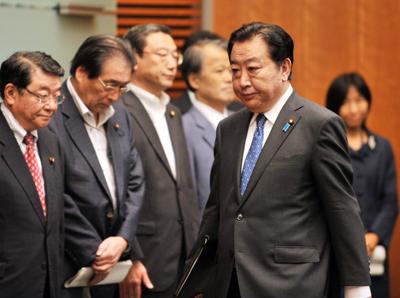Others see the DPJ under Noda as abandoning the DPJ’s pledge to break with LDP-style politics and see the DPJ returning to the LDP’s close ties to bureaucrats and vested interests.
The first view mistakes what is merely a political ceasefire for a coalition, while the second takes too short a view of ‘reform’ in Japan. In light of the social and political conditions in Japan, it is inconceivable that this political ceasefire will develop into a full-fledged coalition.
The details of the agreement make it clear that it is merely a compromise that leaves disagreements on social security reform in place. The DPJ has made concessions, such as scaling back the initial proposal to expand coverage of non-permanent workers under the employees’ pension scheme to an additional 450,000 people to 250,000.
The DPJ had to compromise because its ideas of helping the poor were not consistent with achieving fiscal balance, and the party was not powerful enough to overcome resistance from stakeholders’ vested in the old systems. But the DPJ has not lowered its stance on strengthening ‘support from society’ in its reform of pensions and other social security systems. It is not easy to reconcile this with the LDP’s principle of people’s ‘self-reliance’.
After the consumption tax, the next big domestic issue will be the future of nuclear power. While the Noda administration appears to have moved in a pro-nuclear direction by restarting two reactors at the Oi nuclear plant, it sees this as an unavoidable decision in order to balance electricity supply and demand, and is likely to back down from its pro-nuclear position. The LDP, however, has long been pro-nuclear, bearing major responsibility for the ‘nuclear village’ system. The DPJ is unlikely to walk in step with the LDP in promoting a pro-nuclear path. And the LDP’s criticisms of former Prime Minister Naoto Kan’s micromanagement of the 2011 nuclear accident was intended to deflect at least some of the coming criticism of the LDP’s past actions onto the DPJ. Under these conditions, it is unthinkable that the DPJ would enter into a full-fledged coalition with the LDP.
For some time, there has been a theory that Japan is not suited to a two-party system. Japanese political historian and Emeritus Professor at the University of Tokyo, Junji Banno, says that ‘a two-party system cannot function when the parties lack strong convictions in their competing political philosophies’. But while the DPJ argues that it favours ‘social welfare and helping people’ and the LDP says it favours ‘competition and personal responsibility’, both parties are weak in their adherence to these sorts of principles. ‘The differences between the DPJ and the LDP have disappeared’, Banno argues. Indeed, the foreign and security policies of the DPJ and the LDP are virtually identical and convergence is taking place in their domestic policy.
The most desirable outcome would be a reorganisation of politics, dividing those who are independent from bureaucrats and have little connection to special interest groups from those who depend on bureaucrats and have connections with special interest groups. But that is impossible. No matter the basis for reorganising politics, the current structure will not change. Whether it is an alliance between the LDP and the DPJ, or the LDP, DPJ and other political parties following a political reorganisation of some sort, political power will still be distributed around two major parties.
And as long as the public remains dissatisfied with old LDP-style politics, parties that gather support by calling for reform will continue to appear. The question is to what extent the parties can implement real reform.
Like the DPJ, the LDP has not attempted any real internal party reform during its three years as an opposition party. It quickly lost the tension it felt immediately after its election loss and put its efforts into trying to trip up its opponent in order to recapture the government. Without greater efforts, attempts to redistribute political forces by creating new parties, reorganising existing ones or forming coalitions will never succeed in truly changing Japanese politics.
Yoshisuke Iinuma is Contributing Editor for The Oriental Economist.
This is excerpted from an article from the August issue of The Oriental Economist Report. For a copy of the full article, email the editor at [email protected].

